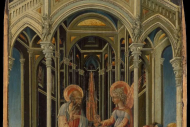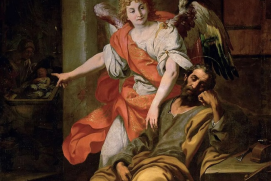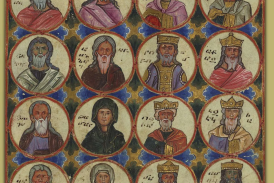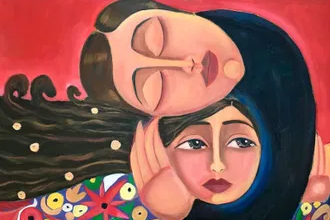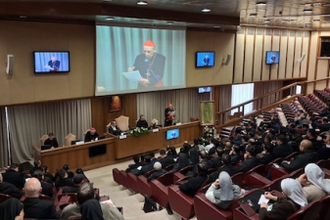Gospel in Art: Feast of Saint Maximilian Kolbe
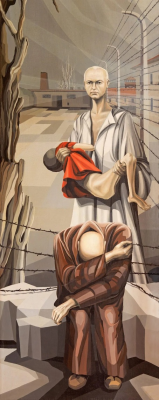
The Holy Martyr Maximilian Kolbe, by Antonio Girardi, 1984, © Alamy
Source: Christian Art
Gospel of 14 August 2023
Matthew 17:22-27
One day when they were together in Galilee, Jesus said to his disciples, 'The Son of Man is going to be handed over into the power of men; they will put him to death, and on the third day he will be raised to life again.' And a great sadness came over them.
When they reached Capernaum, the collectors of the half-shekel came to Peter and said, 'Does your master not pay the half-shekel?' 'Oh yes' he replied, and went into the house. But before he could speak, Jesus said, 'Simon, what is your opinion? From whom do the kings of the earth take toll or tribute? From their sons or from foreigners?' And when he replied, 'From foreigners', Jesus said, 'Well then, the sons are exempt. However, so as not to offend these people, go to the lake and cast a hook; take the first fish that bites, open its mouth and there you will find a shekel; take it and give it to them for me and for you.'
Reflection on the painting
Today we celebrate the Feast of Saint Maximilian Kolbe. Saint Maximilian Kolbe (born Raymund Kolbe) was a Polish Conventual Franciscan Friar. During the German occupation of Poland, he remained at Niepokalanów a monastery which helped to hide, feed and clothe 3,000 Polish refugees, (of which approximately 1,500 were Jews). In 1941, their newspaper 'The Knight of the Immaculate' offered strong criticism of the Nazis.
In 1941, he was arrested by the Gestapo for hiding Jewish people and sent to Auschwitz, where in the most horrific of settings he continued to work as a priest and offer solace to fellow inmates. On June 15, he was even able to send a letter to his mother which reads:
"Dear Mama, At the end of the month of May I was transferred to the camp of Auschwitz. Everything is well in my regard. Be tranquil about me and about my health, because the good God is everywhere and provides for everything with love. It would be well that you do not write to me until you will have received other news from me, because I do not know how long I will stay here. Cordial greetings and kisses, affectionately. Raymund."
In July 1941, three prisoners appeared to have escaped from the camp; as a result, the Deputy Commander of Auschwitz ordered 10 men to be chosen to be starved to death in an underground bunker. When one of the selected men Franciszek Gajowniczek heard he was selected, he cried out "My wife! My children!" At this point, Kolbe volunteered to take his place, and he would lead the men in prayer and singing hymns to Mary. From the underground cell in which they were shut up there continually arose the echo of prayers, songs and canticles. They all died shortly after. Franciszek Gajowniczek miraculously survived Auschwitz, and would later be present at Kolbe's canonisation in 1982.
Saint Maximilian Kolbe, pray for us.
LINKS
Gospel in Art: https://christian.art/
Today's reflection: https://christian.art/daily-gospel-reading/matthew-17-22-27-2023/



